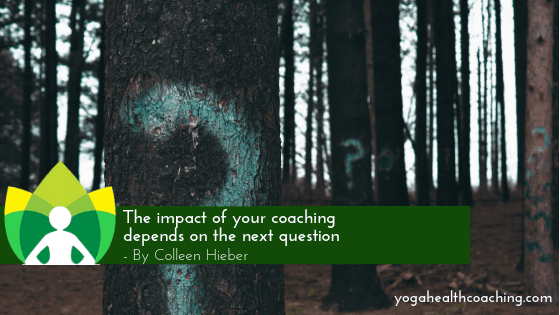
The impact of your coaching depends on the next question
The impact of your coaching depends on the next question
Does your coaching beg the question? And the next question? If you are concerned that you just don’t know enough about Ayurveda or health or life or fill-in-the-blank to coach, I have a question for you. What do you think it takes to be effective at coaching?
We live in the information age. People almost always already know what they need to do. If you have ever tried to give the average person advice, then you understand the futility of adding to the already neglected pile of information. What people need is to be invited into an epiphany of their own. As a coach, you can facilitate this by asking the next, best question. Repeatedly.
In fact, I challenge you to only ask questions and refrain from giving advice. Offer 5 (be willing to do 10!), 15-minute sessions (about any area of life) where you practice the art of listening so that you can ask better and better questions. Questions so direct that they pry open the heart of your clients and allow them to be seen in a way that is profound. It is rare that people have deep, meaningful conversations about their own life. It is even more rare that they have an unbiased, inquisitive ear listening for the words beneath their words. Words that want out but may never have been spoken before.
When you hear a lilt in their voice or a clip in their cadence, that is the indication that the conversation wants to turn in a different direction. This is where you can choose to be bold. Summon your courage to allow the conversation to takes its course without your direction. The shakti is palpable at these points in the conversation and She wants to be heard. Listen. Ask about what you just heard, “I heard your voice change, what is that about?”.
There will be a temptation to guess or direct what comes next. Resist the temptation to lead. Continue to dance, with the shakti in the lead, as you breathe deeply, listen broadly, and remain curious. Keep your body relaxed. If an idea pops into your head about what to ask next, go with it. Even if it seems unrelated. You do this work because you care, not because you’re an expert, and your care is rooted in the wisdom of love. Let love lead.
You have probably heard of the idea that our reality is a reflection of our beliefs. What a conversation heavy with questions does is anchor the container of intimate conversation so that our beliefs about ourselves can be exposed to the fresh air of inquiry. And whatever doesn’t stand up to that inquiry is seen for what it is – limiting, and usually false, belief. Use the following questions (inspired by The Coaching Habit by Michael Bungay Stanier) if you need something to grab onto but I encourage you to preference your intuition:
- When did this first become an issue for you?
- What do you really want?
- What’s stopping you?
- If you don’t get on the other side of this, what will it look like in 2, 5, 10 years?
- If X were solved, what would change for you?
- What’s the real challenge for you?
- Anything else?
At this point, after about 14 minutes, you will have already wanted to give advice. You may have accidentally given it. You may think you know what they need to feel better. You may think you know exactly how to resolve their issue. Make no mistake, your advice would be stellar. But don’t give it. Intelligent, eager-for-help people regularly find reasons why good advice won’t work for them. Ambitious, effective people will rebel against being told what to do. It doesn’t matter if you’re right. Autonomy matters. Instead, ask them what was the most valuable part of this conversation. Take note of what they say. Then thank them for trusting you and ask if they would like you to follow up with them next week. If they say yes, in your follow-up you can give them one small next step to take.
Effective coaching requires good questions which demands deep listening which necessitates space. Give them space. Space in between your questions, space to hear themselves talk, space to be blown away by the obvious next step that they now can see they should take. Space for their epiphany.
After doing this challenge, you will have strengthened the question-asking muscle to such a degree that it will take over in your coaching sessions. After the challenge, when you occasionally do drop knowledge (possibly in the form of advice) it will land with precision and clarity. You’ll be an effective coach. Not because you know everything, but because you dared to ask the next question. Please share your experience with me, I might have a few questions!



